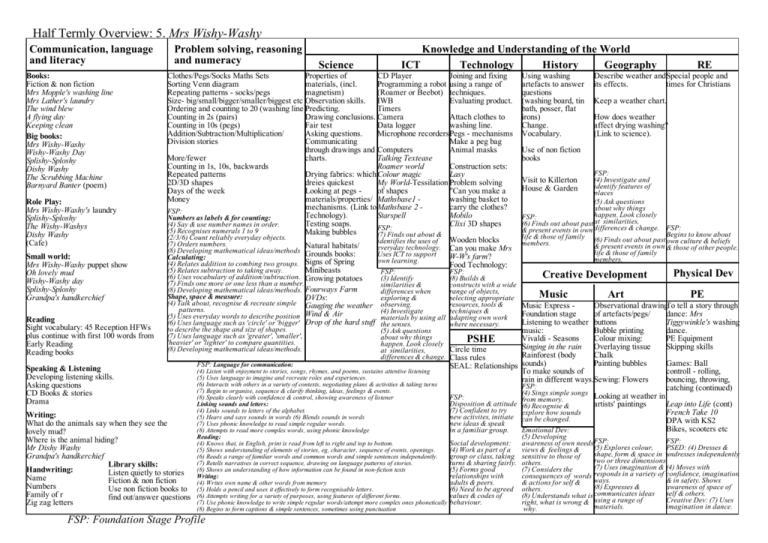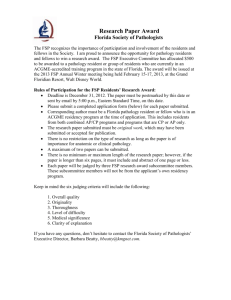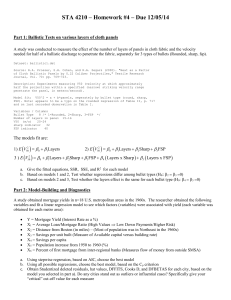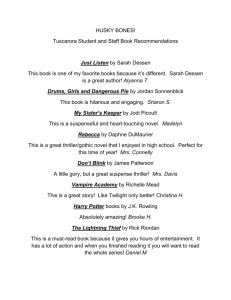Easy Forms Maker:MIDWWASH.IFD
advertisement

Half Termly Overview: 5. Mrs Wishy-Washy Communication, language and literacy Books: Fiction & non fiction Mrs Mopple's washing line Mrs Lather's laundry The wind blew A flying day Keeping clean Big books: Mrs Wishy-Washy Wishy-Washy Day Splishy-Sploshy Dishy Washy The Scrubbing Machine Barnyard Banter (poem) Role Play: Mrs Wishy-Washy's laundry Splishy-Sploshy The Wishy-Washys Dishy Washy (Cafe) Small world: Mrs Wishy-Washy puppet show Oh lovely mud Wishy-Washy day Splishy-Sploshy Grandpa's handkerchief Problem solving, reasoning and numeracy Science Knowledge and Understanding of the World ICT Technology History Geography Properties of Clothes/Pegs/Socks Maths Sets CD Player Joining and fixing materials, (incl. Sorting Venn diagram Programming a robot using a range of magnetism) Repeating patterns - socks/pegs (Roamer or Beebot) techniques. Size- big/small/bigger/smaller/biggest etc Observation skills. IWB Evaluating product. Ordering and counting to 20 (washing line)Predicting. Timers Drawing conclusions. Camera Counting in 2s (pairs) Attach clothes to Fair test Counting in 10s (pegs) Data logger washing line. Asking questions. Addition/Subtraction/Multiplication/ Microphone recorders Pegs - mechanisms Communicating Division stories Make a peg bag through drawings and Computers Animal masks charts. More/fewer Talking Textease Counting in 1s, 10s, backwards Roamer world Construction sets: Drying fabrics: which Colour magic Repeated patterns Lasy dreies quickest 2D/3D shapes My World-Tessilation Problem solving Looking at pegs Days of the week of shapes "Can you make a materials/properties/ Mathsbase1 Money washing basket to mechanisms. (Link to Mathsbase 2 carry the clothes? FSP: Technology). Starspell Mobilo Numbers as labels & for counting: Testing soaps. Clixi 3D shapes (4) Say & use number names in order. FSP: (5) Recognises numerals 1 to 9 Making bubbles (7) Finds out about & (2/3/6) Count reliably everyday objects. Wooden blocks identifies the uses of (7) Orders numbers. Natural habitats/ everyday technology. Can you make Mrs (8) Developing mathematical ideas/methods Grounds books: Uses ICT to support W-W's farm? Calculating: own learning. (4) Relates addition to combing two groups. Signs of Spring Food Technology: Minibeasts (5) Relates subtraction to taking away. FSP: FSP: (6) Uses vocabulary of addition/subtraction. Growing potatoes (3) Identify (8) Builds & (7) Finds one more or one less than a number. similarities & constructs with a wide (8) Developing mathematical ideas/methods. Fourways Farm differences when range of objects, Shape, space & measure: DVDs: exploring & selecting appropriate (4) Talk about, recognise & recreate simple Gauging the weather observing. resources, tools & patterns. (4) Investigate techniques & (5) Uses everyday words to describe position Wind & Air materials by using all adapting own work (6) Uses language such as 'circle' or 'bigger' Drop of the hard stuff the senses. where necessary. Using washing artefacts to answer questions (washing board, tin bath, posser, flat irons) Change. Vocabulary. RE Describe weather and Special people and its effects. times for Christians Keep a weather chart. How does weather affect drying washing? (Link to science). Use of non fiction books FSP: (4) Investigate and identify features of places (5) Ask questions about why things happen. Look closely FSP: (6) Finds out about past at similarities, & present events in own differences & change. FSP: life & those of family (6) Finds out about past Begins to know about own culture & beliefs members. & present events in own & those of other people. life & those of family members. Visit to Killerton House & Garden Creative Development Music Art Physical Dev PE Music Express Observational drawingTo tell a story through Foundation stage of artefacts/pegs/ dance: Mrs Reading Listening to weather buttons Tiggywinkle's washing Sight vocabulary: 45 Reception HFWs to describe the shape and size of shapes. music: Bubble printing dance. (5) Ask questions plus continue with first 100 words from (7) Uses language such as 'greater', 'smaller', about why things Vivaldi - Seasons Colour mixing: PE Equipment PSHE 'heavier' or 'lighter' to compare quantities. happen. Look closely Early Reading Singing in the rain Overlaying tissue Skipping skills (8) Developing mathematical ideas/methods. Circle time at similarities, Reading books Rainforest (body Chalk differences & change. Class rules Painting bubbles Games: Ball FSP: Language for communication: SEAL: Relationships sounds) Speaking & Listening (4) Listen with enjoyment to stories, songs, rhymes, and poems, sustains attentive listening To make sounds of controll - rolling, Developing listening skills. (5) Uses language to imagine and recreate roles and experiences. rain in different ways.Sewing: Flowers bouncing, throwing, (6) Interacts with others in a variety of contexts, negotiating plans & activities & taking turns Asking questions FSP: catching (continued) (7) Begin to organise, sequence & clarify thinking, ideas, feelings & events. (4) Sings simple songs Looking at weather in CD Books & stories (8) Speaks clearly with confidence & control, showing awareness of listener FSP: from memory. Drama Linking sounds and letters: Disposition & attitude (6) Recognise & artists' paintings Leap into Life (cont) (4) Links sounds to letters of the alphabet. (7) Confident to try French Take 10 explore how sounds Writing: (5) Hears and says sounds in words (6) Blends sounds in words new activites, initiate can be changed. DPA with KS2 What do the animals say when they see the (7) Uses phonic knowledge to read simple regular words. new ideas & speak Bikes, scooters etc (8) Attempts to read more complex words, using phonic knowledge in a familiar group. Emotional Dev: lovely mud? Reading: (5) Developing Where is the animal hiding? FSP: FSP: (4) Knows that, in English, print is read from left to right and top to bottom. Social development: awareness of own needs, (5) Explores colour, PSED: (4) Dresses & Mr Dishy Washy (5) Shows understanding of elements of stories, eg, character, sequence of events, openings. (4) Work as part of a views & feelings & shape, form & space in undresses independently Grandpa's handkerchief (6) Reads a range of familiar words and common words and simple sentences independently. group or class, taking sensitive to those of two or three dimensions. (7) Retells narratives in correct sequence, drawing on language patterns of stories. turns & sharing fairly. others. Library skills: (7) Uses imagination & (4) Moves with (8) Shows an understanding of how information can be found in non-fiction texts (5) Forms good (7) Considers the Handwriting: Listen quietly to stories Writing: relationships with consequences of words responds in a variety of confidence, imagination Name ways. & in safety. Shows Fiction & non fiction (4) Writes own name & other words from memory adults & peers. & actions for self & Numbers (8) Expresses & awareness of space of Use non fiction books to (5) Holds a pencil and uses it effectively to form recognisable letters. (6) Need to be agreed others. self & others. Family of r values & codes of (8) Understands what is communicates ideas find out/answer questions (6) Attempts writing for a variety of purposes, using features of different forms. using a range of Creative Dev: (7) Uses (7) Use phonic knowledge to write simple regular words/attempt more complex ones phonetically behaviour. right, what is wrong & Zig zag letters materials. imagination in dance. (8) Begins to form captions & simple sentences, sometimes using punctuation FSP: Foundation Stage Profile why.



